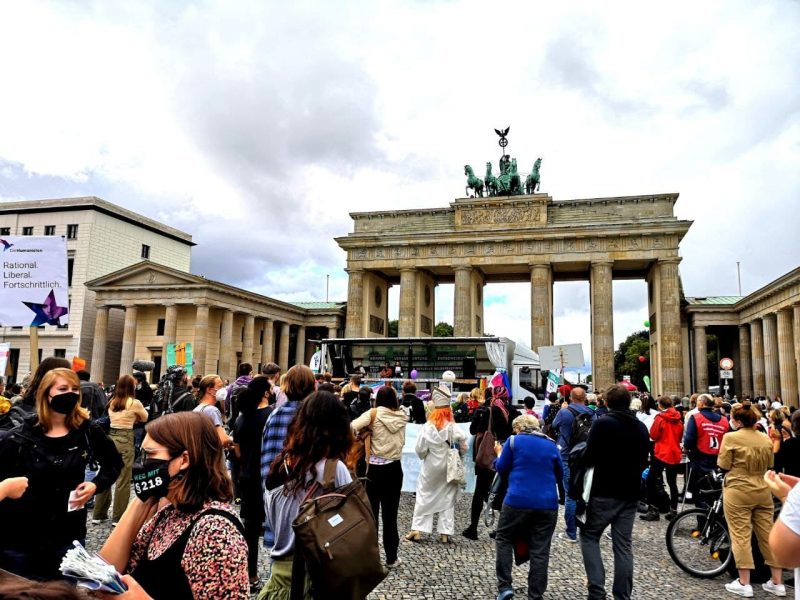150 Jahre Kriminalisierung des Schwangerschaftsabbruchs sind genug

Un año más, participamos en la marcha pro derechos que se celebra en Berlin.
Alegre y combativa contra la tristeza y el fundamentalismo.
#berlin4choice #wegmit219a #wegmit218
Gracias a todas las compañeras, las que organizan, las que luchan cada día, las que acudieron a la marcha y las que vendrán.
Aquí nuestro pronunciamiento que compartimos al final de la marcha.
In Argentina on December 30 feminists celebrated in the streets that abortion is legal and free. In
Mexico last week the criminalization of abortion was declared unconstitutional. In Latin America we
are getting closer and closer to the right to choose whether we want to have children or not and to
enjoy our bodily autonomy. This is the result of a continuous struggle that began decades ago but
which, in Argentina in particular, acquired fundamental importance in 2005, when feminist groups
launched the National Campaign for the right to legal, safe and free abortion. This demand responds
to the urgency of mitigating the deaths of many people who decided to have an abortion, even in
hostile and extremely unsafe contexts.
The “Socorristas,” feminist organizations scattered throughout the continent that facilitate and
accompany safe abortions at home, play a central role because they guarantee a basic right… that of
having a safe abortion, even in a clandestine context. These groups continue to accompany people
who decide not to carry out an unwanted pregnancy, because even in contexts of legality or
decriminalization, not everyone has access to a safe abortion.
Whether on one side of the world or the other, it is always the people belonging to the most
vulnerable populations who have the least access to reproductive justice. In countries such as
Argentina, Uruguay or in some states of Mexico, despite the legalization of abortion, socioeconomic
differences limit the access to sexual and reproductive health, including voluntary interruptions of
pregnancy, as well as other basic rights such as the right to housing, food and education, and the
right to general health services, all of which are fundamental in order to have true reproductive
justice.
In countries such as Germany, where abortion is not legal, but is decriminalized under certain
grounds, it is also the people living in the most precarious conditions who see their access to this
kind of justice affected. A large part of these people are migrants and refugees that are living under
illegal circumstances, who live in even more adverse situations, as they are not only affected by the
economic situation but also by the racism that permeates the whole society. In addition, other highly
discriminated groups such as trans, intersex and non-binary people are also affected, as the health
system continues to be deeply binary and heteronormative.
Despite the belief that it is easy to access to a safe abortion, the truth is that the process is
complicated and full of obstacles. Not only for the users, but also for the medical staff themselves.
Migrant women and gestational people have reported various problems in accessing sexual and
reproductive health services. Among them, the lack of access to information and services in
languages other than German about sexual health and abortion; the discrimination by the medical
staff and their infantilization and denial of information; the limited health system coverage for people
in a so called “illegal” migratory situation; the cost of contraceptives and abortion; the stigmatization
and the lack of information on sex education for their children.
In Latin America, there have been many years of fighting in which we have had to resort to the tool
we have always used in our territories: resistance. To resist not only against the absence of the State,
which is the main responsible for the deaths of thousands of women and gestational people, but also
against the anti-rights groups that have grown alongside the green tide, which not only oppose the
implementation of educational reforms and comprehensive sex education laws and reject same-sex
marital unions and homoparental adoptions, but also carry out campaigns to criminalize abortion
and prevent the performance of abortion for women, girls and gestational people, whose bodies and
psyches are not prepared for parenting.
These movements are growing with the advent of right-wing governments, but again we are on this
side, both in Europe and in Latin America to offer resistance, to guarantee the fulfillment of the
rights we have won so far and to continue fighting for the rights we have not yet achieved.
That is why today we are not only demanding the abolition of Articles 218 and 219a, that is not
enough for us, but we are demanding in Germany as well as in Latin America the right to have a free
sexuality, which is not linked to the fear of abortion, nor to the obligation to procreate. And we also
demand the right to form the kind of family we want, in dignified conditions and in societies free of
racism, classism and all forms of discrimination. ¡Educación sexual para decidir, anticonceptivos para
no abortar, aborto legal para no morir!